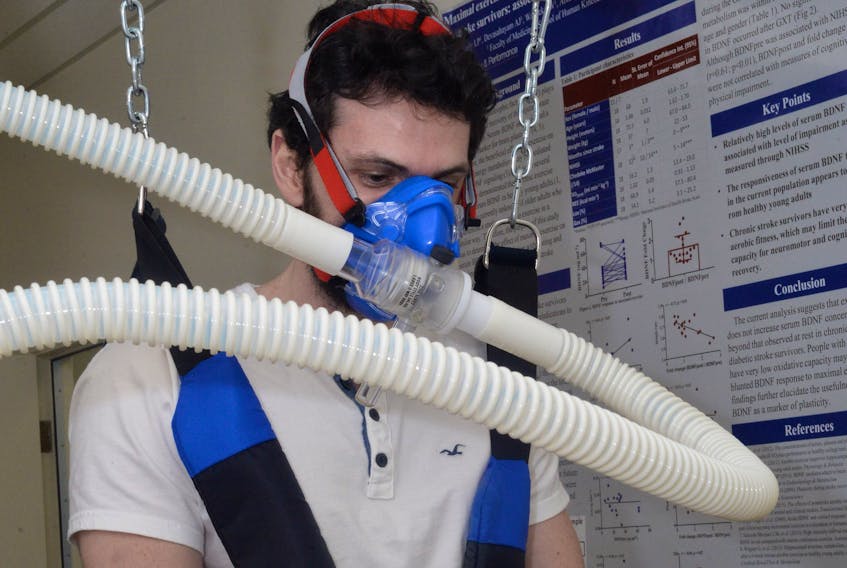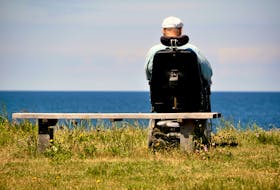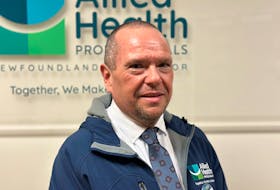There are a lot of cool ideas.
Then there are “cool’ ideas”
And when using that idea helps to make life better for people afflicted with multiple sclerosis, it is a very “cool” idea.
Dr. Michelle Ploughman, Memorial’s Canada Research Chair in Neuroplasticity, Neurorehabilitation and Brain Recovery, along with the principal investigator on the study Augustine Joshua Devasahayam, were pleased with the results in a test group study being done at the Miller Centre in St. John’s.
They have developed a lab, located in the Miller Centre in St. John’s, where they focus on fitness for the test participants, but done in a setting where the temperatures are kept at a lower temperature (14 C).
The research team measured walking speed, oxygen use, lesions in the brain, brain-to-muscle communication and markers of recovery in the blood, all done in this cool, controlled setting.
The study began with 10 participants, suffering from varying degrees of multiple sclerosis. Participants, of which nine completed the entire program, had to do 30 minutes of exercise three times a week over a 12-week period.
“For years, doctors have told those with MS, exercise was a bad thing because it was thought to only make the symptoms worse,’’ Ploughman said.
“Body temperature and not allowing the body to overheat is key in MS patients. Even having body temperature go up half a degree causes problems.’’
That is where the idea of the cold room for aerobic training came in.
Ploughman and her group of PhD-candidate students set out to see if maintaining a lower temperature in an exercise setting would be beneficial to the test volunteers.

They started by knowing Atlantic Canada has the highest rates of MS in Canada and the world.
Ploughman said two factors that contribute to that high rate are lack of vitamin D and genetics.
Some of the variables in the study were unavoidable, as fatigue is a huge problem for MS sufferers. It was thought this couldn’t be fixed, but following the completion of the study, they now know differently.
Participants were cautioned before they started the study that it would either help them or make them feel worse. Everyone was willing to take that chance.
Jennifer Archer, a third-generation MS sufferer who was diagnosed with the disease more than 30 years ago, and Lisa Cooney, who has nearly two decades of navigating through MS issues, were part of the test group.
Both Archer and Cooney not only completed the study, but saw significant improvements to their overall health.
Archer watched her grandmother and mother succumb to the disease, and, based on what doctors told her, didn’t hold out a lot of hope she would have a better outcome than she had already witnessed in her family.
Speaking at an MS Society meeting recently at St. Pat’s Nursing Home, Archer said that when she started the study, she was using two walking sticks to help her maintain balance and simply to just get around.
“When I started the program, I was hoping to get to five minutes. My first time out, I went for 40 minutes. There was a lot of chronic pain, but I kept going,’’ she said.
“I just kept telling myself, ‘you can,’ and kept walking. I am not too far gone yet. The body will heal itself.’’
For Archer, improving her core muscles were key to improving her outcome, and through the 12-weeks of the study she did that and now has discarded the walking sticks, and if anyone sees her now, they would have no idea she used to have difficulty with mobility.
Cooney had a similar resolve.
“The research was tough. To commit to three days a week, it was hard,’’ she said.
“I got on that treadmill and was worked to my brink. Then I got a rest — and then got up — and started walking again.’’
Cooney said she was apprehensive at first, especially for her safety, because of all the issues she has dealt with in having MS. In fact, it was suggested to her during a physiotherapy session that she consider getting a wheelchair.

But that is where her “not me” attitude kicked in and she sought a means to improve her life by regaining her independence and get back to as normal a lifestyle as she could manage.
“They have a harness there — we all call it a jolly jumper — to help you in case you fall, so it is safe to use,’’ she said.
“So we just get on, start walking and see where it goes. We get our heart rates up to 110. You can’t stay in a safe zone (to get results), you have to up the ante.”
Not only has the physical fitness and the mobility of both women improved, their mindsets have vastly changed as well, and any depression they were suffering has gone away, a welcome outcome for both.
“MS does not have control over my life. I have control over my life. I’m a person who has MS, but I’ve pulled MS away from who I am,” Archer said.
Cooney concurred, noting how many obstacles she has overcome in a short period of time.
She said walking was her biggest fear.
“If I go there (for a walk), I have to come back. I didn’t know where that halfway mark was, so I didn’t do it. This has given us control,” she said.
Archer is planning to train for the Tely 10, and she and Cooney both hope to participate in a walk to raise awareness about MS and depression.
They both exercise regularly.
Archer bought a treadmill for her home and walks on it three times a week for 40 minutes while holding on with one hand.
Ploughman said not everyone is going to have results that match Archer and Cooney, but there is hope that through continued studies, commitment by health care professionals and study volunteers, breakthroughs such as this will continue to be discovered.
“I believe that the right attitude, a positive outlook, exercise and a plant-based diet will go a long way to helping forge a better outcome,” she said.
“The people who worked the hardest in this study, we saw the most changes in the brain. The data is not anecdotal.”
This centre is part of the Recovery and Performance Lab at Memorial University.
It is a 2,500-square-foot facility that houses millions of dollars’ worth of equipment that enables Ploughman and her team to conduct these tests and produce evidence-based results through a variety of studies.
At this site, new research about brain plasticity and recovery in stroke and multiple sclerosis is shared based on the information gathered by laboratory researchers, students and study participants.









